
Introduction
Andrew Tate has become a polarising figure in contemporary discussions surrounding social media influence and masculinity. Known for his controversial opinions and lifestyle, Tate has recently made headlines, leading to an examination of his impact on societal views. As a former kickboxer and social media entrepreneur, his ascent to fame has sparked debate over the role that influencers play in shaping public perception and behaviours.
Background and Rise to Fame
Born on December 1, 1987, in Washington, D.C., Andrew Tate grew up in a family of chess champions, which fostered an early interest in competition and success. Tate initially gained recognition in the world of kickboxing, winning multiple world championships, but transitioned into the online space where he cultivated a persona based on wealth, success, and controversial masculinity. His social media presence, particularly on platforms like Twitter and Instagram, has garnered millions of followers, many of whom resonate with his views.
Controversies Surrounding Tate
In 2022, Tate’s views came under significant scrutiny, leading to widespread criticism and bans from several social media platforms. Accusations ranged from promoting toxic masculinity to expressing misogynistic sentiments. His comments often encourage a lifestyle that many deem superficial and harmful, particularly regarding attitudes towards women and personal success. This backlash highlights a larger conversation about the responsibilities of influencers and the implications of their messaging on young impressionable audiences.
Legal Troubles and Ongoing Investigations
In addition to his polarising social media presence, Tate faced legal challenges that further complicated his image. In April 2023, he was arrested in Romania under allegations of human trafficking and rape, prompting discussions on accountability and celebrity culture. While he maintains his innocence and claims the charges are unfounded, the investigation continues to draw intense media attention, amplifying his controversial status.
Conclusion: The Future of Andrew Tate
As Andrew Tate’s notoriety grows, the discussion surrounding his influence on young men and societal norms does as well. While some view him as a beacon of entrepreneurial spirit, others warn of the dangers posed by his rhetoric. With ongoing legal issues and a fluctuating presence on social media, the future remains uncertain. However, his ability to capture attention and spark debate ensures that he will remain a significant figure in contemporary discussions about online influence and masculinity. For readers, understanding Tate’s impact serves as a reminder of the power of digital voices in shaping modern culture.
You may also like

Ruth Dodsworth: Overcoming Adversity and Inspiring Change

The Rise and Influence of Kylie Jenner

The Life and Legacy of Freddie Scappaticci
SEARCH
LAST NEWS
- Remembering Wendy Richard: The Promise to Co-Star Natalie Cassidy
- How Did Anglian Water Achieve an ‘Essentials’ Rating for Mental Health Accessibility?
- Shai Hope Leads West Indies in T20 World Cup Clash Against South Africa
- What We Know About Weston McKennie: Future at Juventus and Past at Leeds
- What We Know About the Upcoming Live Nation Antitrust Trial